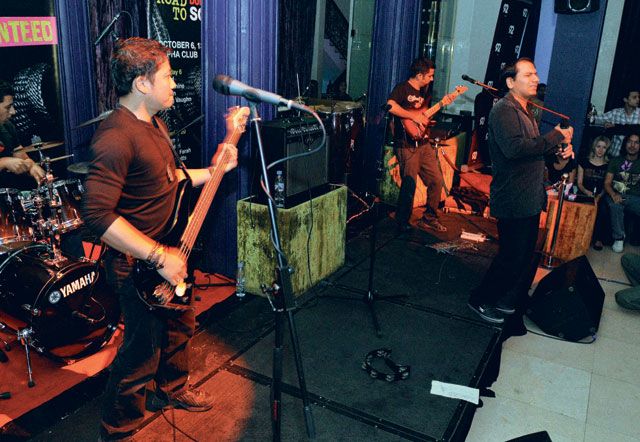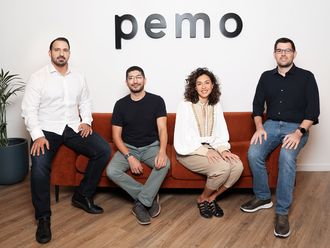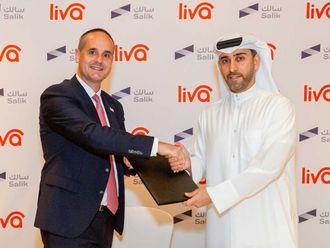Original rock music is not yet at the heart and soul of Dubai's culture, but Quay Evano, 37, is happily strumming away. He's not doing it for the money, but for the love of music.
Evano is an office worker by day and a musician by night, mostly on weekends. In the few years that he's been in Dubai, the Filipino expatriate has hopped from one band to another, performing as bass guitarist in various events, music festivals and private parties.
Evano is not the typical band member that you see at your favourite bar performing mainstream music or playing the hit songs of Aerosmith and Michael Jackson. He's more into songs of original material, those that are created by UAE-based music bands.
His latest venture is with the local multi-racial group called Moonshine, which is currently focused on producing its debut album. At the same time, he's also looking for a performer and a financier to record an album of his original compositions of rock ballads.
Like every musician, Evano hopes to land in the international music scene someday, but the road to global stardom runs uphill.
Even the local music market is already hard to crack. Making it big locally requires not only loads of creativity and talent, but a considerable amount of out-of-pocket money. Producing a 10-song album alone can cost about Dh40,000, something that an average salaried father of two would find it difficult to produce.
Self-financed
"All the albums are self-financed by bands here. Most original bands pay out of their own pockets to promote their music, make their own website, flyers, CDs and other stuff. Everything comes from them," says Evano.
There are other costs involved, too. Evano had invested about Dh3,000 in two bass guitars to be able to perform in Dubai. If he were a lead guitarist, he could have to spent more, or about Dh20,000 on guitars, amplifiers and other accessories. Musicians also need to shoulder the cost of renting a studio for rehearsals.
"When I was with my former band, Borrison Ivy, we used to pay Dh500 for every four to five hours of practice. We would divide the cost, at Dh125 per person. To minimise spending, we would assign someone from the group to bring food for dinner in the studio. We used to practice once or twice a week," Evano recalls.
"Then, there's transportation cost. We would use our own cars to go to a gig, which can be as far as Ras Al Khaimah or Abu Dhabi," he adds.
But all these investments will be recouped, right? Not quite. The talent fee for local stage performers in Dubai isn't that lucrative.
In his experience, Evano says each original musician gets paid anywhere between Dh500 and Dh4,000 for every live gig. He will be receiving his highest pay (Dh2,000) this coming New Year's eve, when he will be performing with the Moonshine band in Abu Dhabi.
Fan base
Most of the time, original bands that are still creating a fan base are performing for gratis. They may get freebies such as dinner, drinks or a bottle of perfume, in exchange for a night of singing, head banging, strumming and drumming.
"Only those who are cover bands (who perform popular or international songs in hotels or bars) really get paid regularly. But if you're an original band playing your own original songs, you don't usually get paid because you are still trying to make a name for yourself. It's a struggle," says Evano.
"The people here are still not very supportive of original rock music. They usually patronise international rock acts. The thing is, there's not much hype about original bands. That's probably one of the factors that hinder the growth of the original rock music industry here," says Evano.
Although there are some radio programmes that help local bands get noticed, musicians also often struggle to get media mileage. "The bands themselves contact the media to get coverage. In the US, they have PR people to do that. Magazines here don't really give you coverage unless the event is really that big," he adds.
Personal issues within the band itself can also hinder a musician's career. Only this year, one of his former bands disbanded after a failed attempt at producing its debut album. The band had already spent about Dh7,000 on the initial stages of recording the album between last January and April, but the project never took off.
"The album was 90 per cent finished, but there were disagreements, miscommunication… The vocalist could not make the vocal recordings for one reason or another. So, now the project has stopped and I think it's a dead end," says Evano.
"The problem with bands is that every member wants the best to come out of every project. When these creative personalities clash, it can create a problem," he adds.
Disadvantage
Regulations and local processes can also be a disadvantage. Last year, Evano and his fellow band members ended up playing off stage inside a hotel in Dubai for lack of an event permit. Another major gig got canceled at the last minute for the same reason.
"You can't just perform in Dubai anytime you want to. You need to submit your visa and passport to get an entertainment licence every time you have a gig. And the permit doesn't just land on your lap. You need to apply for it one month or two weeks before the event. I'm not sure if that's the same for all the other emirates, but that's one thing I noticed in Dubai. In Ras Al Khaimah, we haven't been asked to get a licence to perform," Evano says.
"And if you do get to perform, you have to be wary of certain restrictions. Although it's an open city, Dubai still has some limitations. There are words you can't use or songs you can't sing. We're aware of the religious sensitivities and we respect the law, but sometimes it's a bit stifling. Unlike in the Philippines or in other countries, you'd see musicians shouting profanities on stage, but people understand it's just part of the act," Evano adds.
Still, all these issues fail to deter Evano from pursuing his craft. He exudes determination to continue playing on stage, even it means doing or sacrificing more than what he gets — or is paid for.
"It's not easy being a musician in Dubai. I've invested so much time, money and effort and the income I get is not even enough to repay that. But it's the pleasure of performing your own songs to a crowd that keeps me going. Money can't buy that feeling. I think that's what satisfies a lot of musicians," he says.













